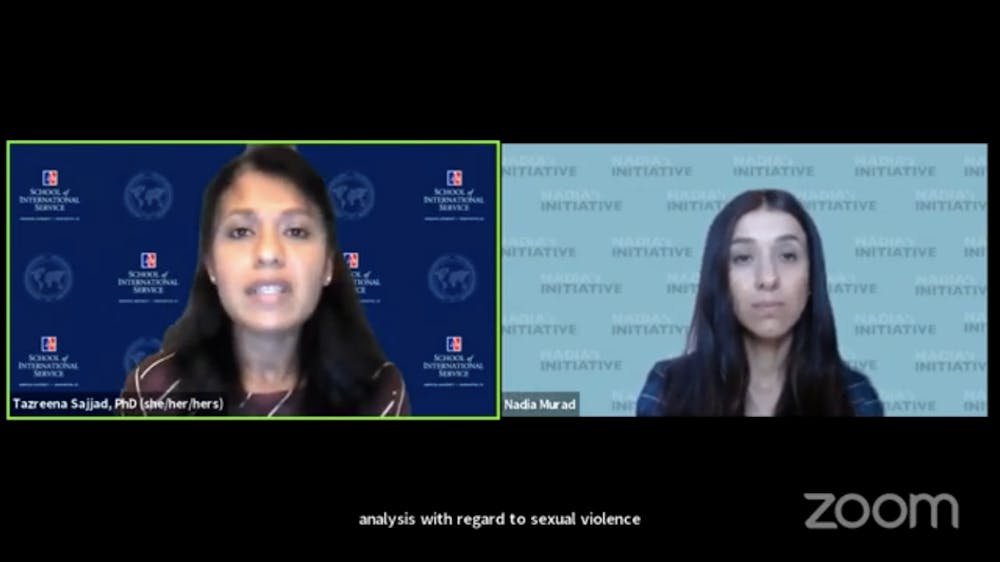Nobel Peace Prize laureate and human rights activist Nadia Murad discussed the importance of her work as an advocate for survivors of genocide and sexual violence in a virtual event hosted by the School of International Service on Oct. 19.
Murad has used her story of surviving imprisonment by ISIS during the Yazidi ethnic cleansing to found Nadia’s Initiative, a nonprofit dedicated to rebuilding communities in crisis and advocating globally for survivors of sexual violence.
“I started Nadia’s Initiative because I wanted to be able to create sustainable solutions for my community’s recovery,” Murad said.
Murad’s life was uprooted when ISIS attacked her village in 2014 during the Sinjar Massacre, a religious persecution of the Yazidi people in Sinjar, Iraq. Murad, along with thousands of other young Yazidi women, was taken prisoner and subjected to daily sexual violence for three months before she was able to escape to a refugee camp and eventually move to Germany, where she now lives.
The conversation was moderated by SIS professor Tazreena Sajjad, who asked Murad what justice would look like for her and the other women and girls of Sinjar.
“Nadia’s Initiative and Yazidi activists are striving for holistic and reparative justice,” Murad said. “This means holding ISIS accountable for genocide and sexual violence, not just terrorism.”
Since her escape, Murad has published a New York Times bestselling memoir, “The Last Girl: My Story of Captivity, and My Fight Against the Islamic State,” to raise awareness about the ongoing plight of the Yazidi people. She now works with both local and global leaders on the sustainable redevelopment of the Yazidi homeland to restore their education, healthcare and culture.
“The majority of the Yazidi community is still displaced in camps, only a few hours away from their homes,” she said. “They are unable to return because Sinjar’s basic infrastructure, clean water, roads, schools, houses and hospitals, were destroyed.”
Nadia’s Initiative is currently working with various international governments, the United Nations, nongovernmental organizations and survivors living in Sinjar. The restorative measures have so far helped erect schools, farms and hospitals, allowing a growing number of Yazidis to return home.
Regarding the misconceptions that people may have about displaced women and girls, Murad said it is important to acknowledge their stories while also respecting their power and agency.
“We need to do more to protect the rights and safety of women and girls from conflict-related sexual violence, but we should never think that they are weak or helpless,” Murad said. “It is this kind of thinking that justifies misogyny. Women and girls have a really important role to play in post-conflict peace building and development. They have so much to contribute to our societies, but they are only empowered to do so if their basic rights are respected.”
Despite her organization’s progress, Murad said there is still a long road ahead with locating and rescuing the many Yazidis that remain in ISIS captivity, some of whom are her own family.
“There are still about 2,800 Yazidis missing in captivity, including my niece, my nephew and my sister-in-law,” Murad said. “We still don’t know where they are.”
Murad cautioned her audience against letting stories of war overshadow the human element, encouraging listeners to also learn about the culture and people of minority communities so their voices get heard.
“There is more to the Middle East than oil and war,” Murad said. “There are people just like you who want to build a better world. In your studies, I hope you will all seek to understand how common and marginalized people are affected. I believe this understanding will be a bridge to collaboration and changes.”





